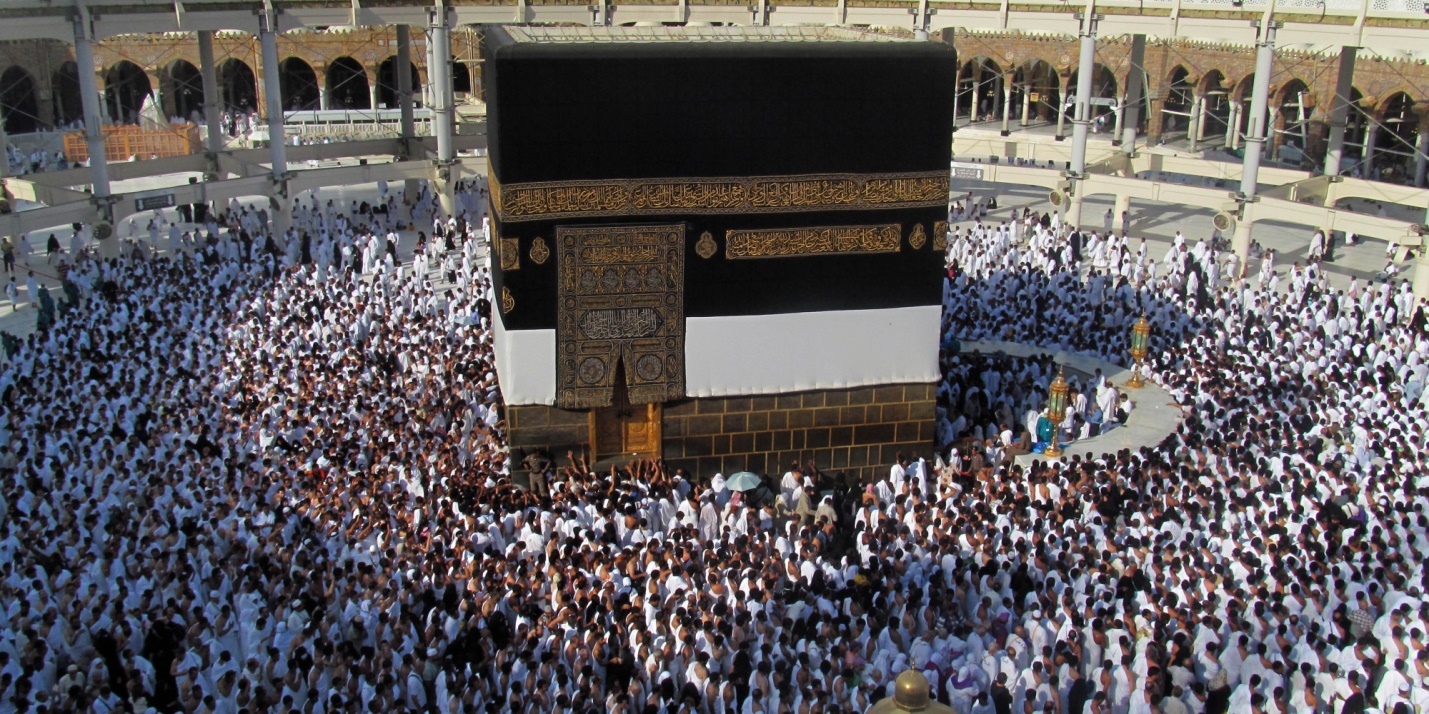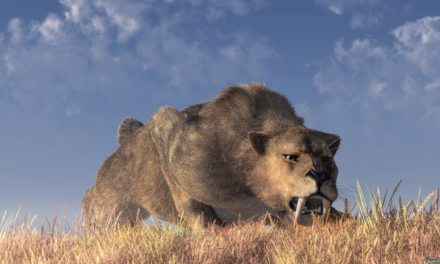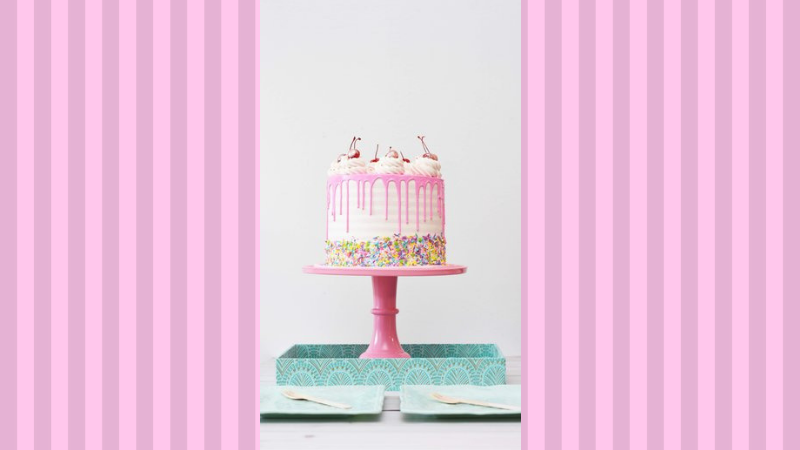After what seems like only weeks past the Eid of Ramadan, Muslims celebrate yet another festival – Eid Al Adha – the Festival of Sacrifice. Eid Al Adha (pronounced as it looks: ‘eed al ad-ha), marks an important day and ritual in the once-in-a-lifetime Pilgrimage to Mecca – one of the five pillars of Islam.
All Muslims who can afford the costs, bear no debt, and are able to support families in their absence, are required to make this journey. It is perhaps the greatest culmination of our faith. Muslims travel from all corners of the earth to gather in Mecca, Saudi Arabia and enact several rites around or near the Kaaba, the object to which all Muslims face in prayer five times daily. It is a heart-stopping, weak-in-the-knees moment for all who look upon the Kaaba for the first time. For Muslims, it is the very center of the universe.
A first act upon reaching Mecca, dressed in very simple garments of two unstitched cloths, representing the unity and brotherhood of mankind, pilgrims greet Allah by circumambulating the Kaaba seven times. Doing this on the lesser pilgrimage, Umrah, (done at any time of the year and as often as one can afford), is a piece of cake compared to the Hajj. I liken it to ‘me and Allah’ as compared to sharing Allah with 3 million people’! It is thrilling and somewhat terrifying at the same time. At times like the company of your best friends and at times like 3 million strangers with whom you share little in common other than the basics of the faith.
Malaysians walk in enormous rectangles of men, corralling and protecting their womenfolk on the inside. I passed a very determined and serious Malay brother, calling out, “Ya Salaam! Ya Rahman!” Oh God, the Peaceful, the Merciful. He paused, then smiled and off he marched with this new mantra. I still remember the smile that lit up his face as if he only now remembered the real purpose of his visit.
All rites and rituals are in remembrance of acts of Abraham, the great patriarch of Judaism, Christianity and Islam. Muslims learn in the Quran that Abraham built or rebuilt the Kaaba as the first house of worship of God. It is said the original house was actually constructed by Adam. Abraham and his son (believed to be Ismael) were commanded to build then Kaaba, and then circle round it seven times with words of praise and supplication for good in this life and the next. Once pilgrims finish their seven rounds they pause and offer two short units of prayer in remembrance at the station of Abraham. Encased in glass is said to be his preserved footprint.
Next comes more rounds of walking and a bit of running in remembrance of Hagar, the second wife of Abraham. She was led into the barren Arabian desert by command of God with her small child, again believed to be Ismael, then left there by Abraham. When she understood that leaving them was part of God’s command, she accepted and submitted to God’s will. However, fear and thirst later led her on a frantic search for water for herself and small son, running from the top of one hill to another. Pilgrims reenact this desperate run for water (now in air conditioned comfort!) between what is left of the two hills. It is an amazing feature of the Hajj that the acts of a woman are commemorated yearly in remembrance of her sacrifice and submission. Pretty cool for a religion that is alleged by many to be oppressive and restrictive of women!
Muslims understand that a miraculous well of fresh water appeared for Hagar and her son. The water drew birds and also the attention of caravans and travelers who settled near the miraculous water, woman and child. From his grew the city and pilgrim destination of Mecca. The well of Zam Zam continues to flow and alleviate the thirst of the millions who flock to Mecca each year. It is said to have great healing properties. Zam Zam water goes a long way to quench your thirst in the ever hot and dry climate of Arabia.
Although our glimpse of the Kaaba is often the highlight of the journey, the main act of Hajj is the Day of Arafah. Pilgrims leave an enormous tented area outside Mecca and make their way to a flat plain topped by a small, climbable mountain. It is here we understand we will return after our resurrection from the grave where Allah will judge us according to our deeds. Pilgrims will spend the entire day from sunrise to sunset, supplicating God for forgiveness. Tents are supplied as well as rest facilities, food and water to comfort all those standing for hours in the sun and heat. Although Hajj, like Ramadan, follows a lunar calendar and so makes its rounds throughout the calendar year, it is nevertheless always hot and dry in Saudi.
It is said that if our supplications are accepted on this day and the Hajj rituals completed with satisfaction, our sins are completely erased and we return to our normal routine like a newborn babe. Hopefully we return changed for the better and not ready to stack up another pile of mistakes for which we need forgiveness! Hajj is meant to be a once in a lifetime venture.
The Day of Arafah concludes at sunset and then is followed by a rather arduous night journey to other locations coupled with rites to be enacted. By sunrise, pilgrims should find themselves outside the tented area once again. We, like many others, were bused from Arafah but later mired down on the clogged roads. We all fell asleep only to awake at 2 am and hopped off the bus in a mad rush to complete the night’s required steps. Following the choked and diesel fumes-filled road, we struggled with others to make our way back. That night was one of the biggest struggles (jihad) of my life. We finally made it to our last destination as the sun rose, sleepless in Mecca and with a killer sore throat from all the diesel fumes.
Eid morning and I remembered it was my birthday! I truly felt blessed that, God willing, my past mistakes had been wiped away and I was starting life anew! We made our way to the sacrificial area where animals are brought in to commemorate yet another act of Abraham who was tested by God to sacrifice his son. Many are familiar with the story of how God sent a ram in place of the son, pleased with the willingness of Abraham and his son to submit to His command. Muslims everywhere in the world on this Eid Day do the same. Animals, notably a lot of sheep, are slaughtered in accordance with Islamic rulings, and the meat distributed to the poor throughout the world – often enough to ensure that a family will have enough meat to last them a year.
If you have Muslim friends, you may have seen a plethora of cute sheep pics and funnies coming across social media on Eid al Adha in which all Muslims worldwide join in the celebration with the Hajj pilgrims. Funny how we seem to need an Easter Bunny or a Shaun the Sheep character to associate with our holidays. Not at all sure that’s the correct intention but we all seem to fall for the clever or the cute.
During our night walk, we gather small pebbles that will be used throughout the next three days in a symbolic stoning of the Devil. This again harks back to Abraham who was tempted along with many of our righteous forefathers, beginning with Adam. Over the years, Saudi Arabia has developed various pillars as a representation. Many pilgrims become quite zealous during this rite and anything might come flying past including sandals, other personal items and some sizable rocks! There have been serious repercussions in past years where stampedes occurred, resulting in the death of hundreds. For me, I was taking a whack at the very things in me that I would like to change; taking out my fury on this cement Satan to force him to retract his whispers that compel me to do wrong sometimes. Better that I should not listen at all! But that is what we understand to be the real jihad in our lives.
Pilgrims then make a final circling of the Kaaba in farewell. The magnetic pull of that 24/7, unending circling is painful to break away from. For Muslims, Mecca is our home, our center, no matter where we live, no matter who we are. Each year when we look upon the Hajjis (Pilgrims) and the thousands of pics and snapchats that now flood the social airways, we all pray to be reunited with this love of ours. And perhaps, God will again call us to be His guests.













